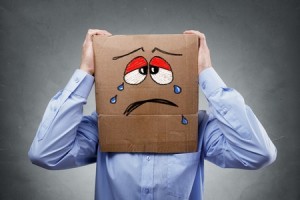Pain, suffering, confusion and hopelessness …
Do you feel anxious, stressed, unhappy, depressed?

You might have problems that have been given a name by your G.P such as depression, anxiety, panic attacks, obsessive or catastrophic thinking, obsessive compulsive disorder, or PTSD. You might be suffering from unmanageable stress and anger, be it rage or repressed anger, or you may self-harm, have problems with sleep, addictions or eating issues. You may feel suicidal, lonely, despairing or empty, unlovable or unworthy.
“I don’t know which way to turn …what to do …what’s the matter with me?”
You may feel dissatisfaction with life or have lost your direction or sense of purpose….a terrible sense of disconnection painfully weighing you down.
Have you had a diagnosis of Anxiety and Depression?
Much research has been done over the decades as to the cause of anxiety and depression and there is more than overwhelming evidence that chemical imbalance is not the causal factor in the majority of people. Your diagnosis was made as you will have shown that you have at least five out of the nine symptoms nearly every day and that these have persisted. Like-wise it would seem that these are also all the things you would experience if you were grieving, suffering hardship, or deeply unhappy with your life.
The symptoms described as anxiety and depression are feelings denoting human suffering. Your pain and suffering expressed through your mind and body are gripping you to get your attention. These debilitating sensations, anguish and torment are telling you that your psychological needs, social needs and relationship needs are far from being met.
So hard are these emotions to bear within ourselves and by the people around us, that we do anything to get rid of them – drugs, alcohol, over or under eating, over working, self-harming, staying in bed and avoiding living.
What’s going on?
Your reactions to life can cause intense anxiety and distress with resultant high levels of cortisol being released into your blood. When distress is experienced daily, as many of us do, then your body stays on high alert. When you have too much cortisol in your blood for a long period, inflammation can occur. This results in feeling sluggish, without energy and with painful aching joints. This slows us down, leading to further inactivity, poor eating and sleeping, exercise is neglected and this all makes us feel truly awful. A vicious cycle downwards exacerbated by avoiding other people, isolation and resultant emotional pain.
High levels of distress will have the capacity to induce feelings of misery and can embed or fix our reactions to people and situations. These debilitating affects can become stuck and difficult to shift.
The view from the field of neuroscience is that mental health illness is not found in distinct categories and do not have firm boundaries. The line between anxiety and depression is evaporating as people who are diagnosed with either anxiety or depression may have very diverse symptoms. It seems variation is the norm and anxiety and depression frequently occur together.
Why does my suffering stick to me like this?
 The hopelessness, despair and unworthiness you experience is an understandable response to adversity.
The hopelessness, despair and unworthiness you experience is an understandable response to adversity.
From the moment we are aware of our separateness from our mother, we make our way in the world by making choices that feel right and fit with the ‘People in Charge’. Our early choices help us to fit into and cope with our circumstances. Some of these ways may help us grow and reach our potential and some may hold us back. This becomes apparent as we approach adulthood when symptoms of anxiety and depression debilitate and limit functioning. Self-medication through over work or addiction may add to our dysfunction. As adults we can make new choices and change some old decisions, beliefs and limiting strategies.
Most parents do their best, but can fall short of providing everything that is needed. This seems especially true as communities are less cohesive and opportunities to share pain are given only a token glance by our constant comparing and need to be perfectly happy. It’s unsurprising that the majority of us develop some insecurities, unhelpful distorted beliefs and unsustainable ways of coping and living. Our unique history of life-long experiences re-creates and perpetuates our own unhelpful finger-print reaction to ourselves, people and our environment. When you experience life as hopeless, despairing, confusing and failing you are not only suffering from adversity but more importantly adding to your suffering ten-fold by the way you see yourself, other’s and the world you occupy.
Your capacity for resilience
There is evidence that we are born with different capacities to endure stress. This is known as our tolerance or resilience. Experience outside of our tolerance, be that a large incident or a prolonged period of smaller incidents can be overwhelming and is experienced as trauma. This will activate the fight/flight/freeze defences to help us to survive until safety returns.
Trauma will be remembered in the unconscious parts of the brain and in the body and we will experience distress if we encounter anything that resembles the old trauma even if we have no conscious memory or narrative. Trauma lives on as anxiety and depression, panic attacks, nightmares, flashbacks, numbness and spaciness.
Adolescence, old age, pregnancy, menopause and Thyroid/Adrenal malfunction
Anxiety and depression can increase during times of hormonal imbalance, puberty and declining age. Our body changes will set up imbalances that will cause internal stress. How we cope with body stress is also dependent on how emotionally aware we are and the choices we make to take care of ourselves.
Will psychotherapy help?
Research from neuroscience shows that our brains have plasticity and new ways of living, when explored and lived out, will form new brain wiring giving different options from your outdated unhelpful ways.
A supportive and empathic therapeutic relationship provides the safety and understanding that allows your trauma and old ways of being to be understood and so integrated. It is now a bad memory that is remembered and firmly in the past rather than acted out and lived every-day.
For anxiety and depression, the most effective way is through working with a supportive and attuned psychotherapist. This gives you the opportunity to explore your thoughts, feelings and fears – understand and accept them and the messages they hold.
By exploring and fully understanding your reactions in depth a process of self-soothing develops. This essential life enhancing support promotes well-being, resilience and self- protection.
Exploring your own personal story with your therapist, every aspect of you, with kindness and authenticity, can transform how you feel and heal your mind and soul.
As this continues within your therapeutic relationship, symptoms of anxiety and depression reduce and energy and aliveness return.
The supportive therapeutic relationship as described will be an environment to…
- Explore your personality and find out what lies behind the depression, anxiety or other emotional or behavioural difficulty that you experience and make links to your earlier life and relationships.
- Understand how you learned to live through sometimes intense and unmanageable feelings by relating to others and yourself in particular ways, some helpful and some limiting.
- Identify how these ways may be holding you back in your life, exploring and changing the old unhelpful ways of doing and behaving and letting go of the emotional pain and shame that lies beneath.
- Discover the choices that are available to you and widen your experience of living for yourself and those close to you.
- Learn new skills to manage your emotional well-being.
If you would like to find out more please contact me on 07880 668651 or email: fi***@si**************.uk
BACP Accredited & registered therapist, based in Bowdon, offering counselling and psychotherapy services in South Manchester covering Hale, Wilmslow, Altrincham, Timperley, Knutsford and Cheshire areas.


